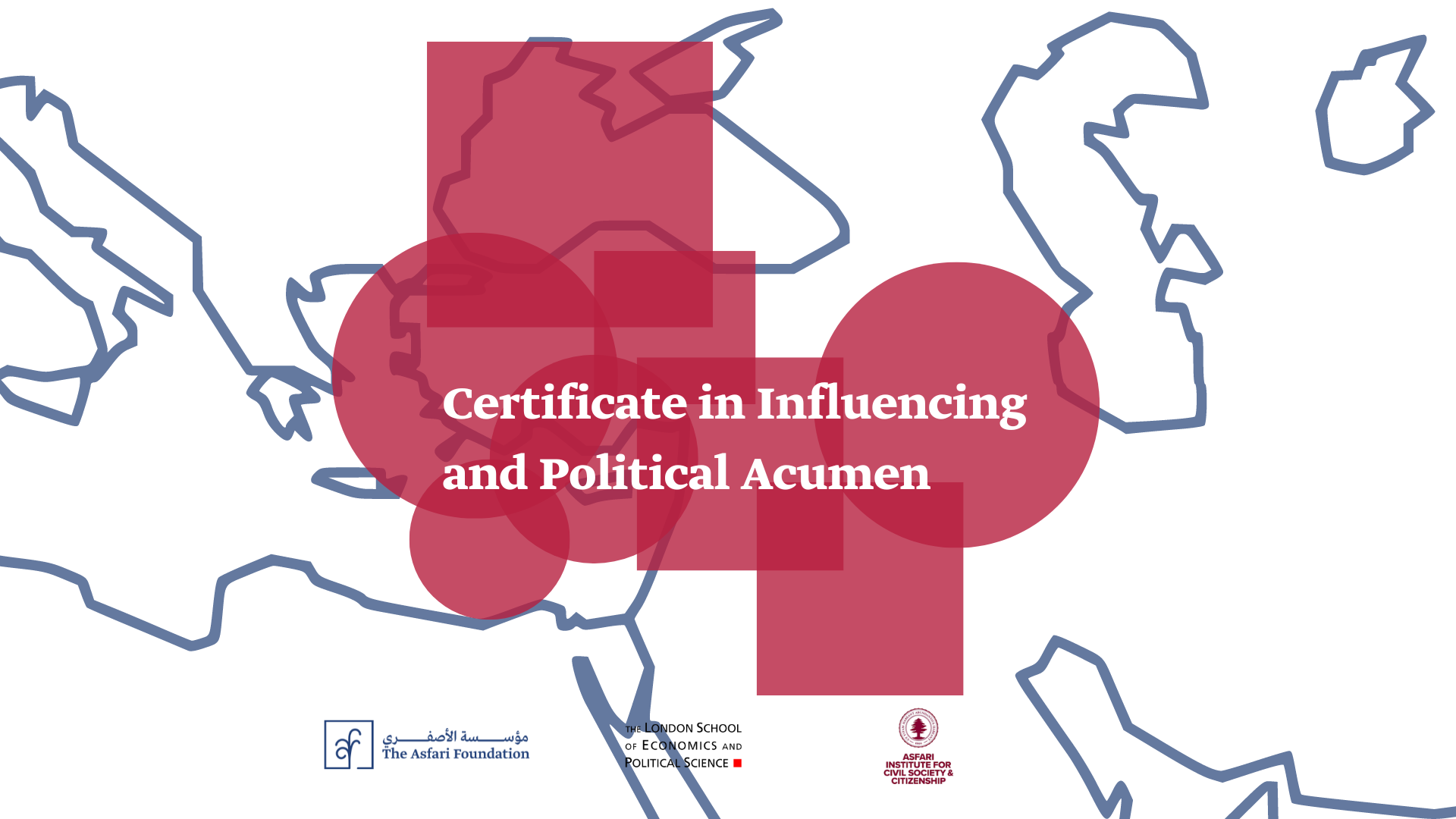
Introduction
The course will develop participants’ political analysis and influencing skills through discussions of heuristics, frameworks and case studies. This will be achieved through a combination of in-person teaching sessions, facilitated activities and peer-to-peer learning opportunities; a bespoke multimedia library of learning materials; and online coaching sessions. The curriculum will move from theory and frameworks for thinking, to the use of practical skills and tools for designing influencing strategies.
The course responds to an identified need to assist civil society in the region to refocus on advocacy, challenging the status quo and seeking transformative change. This follows years of donor funding that has concentrated on humanitarian responses and service delivery. Nonetheless, throughout, an emphasis will be placed on contextualising the discussions with relevant case studies and insights, and on sharing and building on the knowledge and experiences of participants.
By the end of the course, participants will have developed their own influencing strategies under the guidance of facilitators. The best will have the opportunity to receive funding from the Asfari Foundation.
The Team
The team combines the academic, practical and regional knowledge of facilitators from two prestigious academic organisations: The Asfari Institute and the LSE.
The Asfari Institute for Civil Society and Citizenship at the American University of Beirut is a regional hub that seeks to serve and resource the growing ecosystem of civil society in the Arab region through amplifying knowledge production and dissemination, creating safe physical and virtual spaces for convening, learning, networking, mobilizing, and collaboration. It aims to serve communities in the region from all social strata and gender identities, including and not limited to Lebanese citizens, the refugee community, and the migrant domestic community.
Participants
The course will invite pairs of senior leaders and middle management staff from selected organisations to participate together. This will enable the skills imparted by the course and experiences shared by participants to permeate different levels of the participating organisations. It will also support candid discussions of what is possible in different contexts and across different issue areas and ensure the sustainability of the lessons learned.
Learning Objectives
Participants will acquire a combination of practical and analytical skills, backed up by useful knowledge of relevant issues. The course will also aim to reinforce a set of progressive attitudes on how to bring about change.
Practical Skills:
Leadership skills (the ability to delegate, inspire and communicate effectively to maximize impact).
Networking skills (ability to use personal communication, relationship management and professionalism, as a means of building connections with others)
Mobilization skills (ability to engage different stakeholders)
Policy analysis and research skills (ability to create, analyse, or interpret information and develop arguments)
Communication skills (ability to discuss and debate issues respectfully and productively through the use of use of social media, online petitions, community organizing, direct action, and advocacy messaging)
Analytical Skills:
Enhanced critical thinking skills (ability to analyse and evaluate issues and policies)
The ability to analyse problems and processes in order to identify promising points of entry and windows of opportunity for influencing strategies
The use of different techniques to understand the range of different types of power (visible, hidden etc) involved in either achieving or blocking a particular influencing strategy
The use of stakeholder mapping to understand the opportunities and constraints on particular decision makers, and thus build a bridge to a viable change strategy.
Knowledge:
Understanding of political, social, and economic systems and structures and the ways they affect the issues being advocated for
Knowledge of a range of advocacy and influencing tactics and strategies, including grassroots organizing, lobbying, coalition-building, and media outreach
Familiarity with human rights frameworks, principles, and standards relevant to the issue being advocated for
Review the evolution of civil society and activism in the region.
Establish a network of advocates from different areas of expertise who can lobby for common goals.
Increased knowledge around the importance of diversity and inclusion in institutions, policies, and society
Positive Attitudes:
Remain accountable to their communities and connected to needs on the ground.
Ethical and professional conduct, including transparency, accountability, and respect for diversity and human rights.
Increased empathy and understanding towards the needs and experiences of the communities
A more nuanced understanding of different issues and the ways in which they intersect with other forms of oppression and discrimination, and being able to communicate and raise awareness around gender-related issues within communities
Reflexivity, using their own lived experiences to reflect, recognize and address gendered and other biases within their immediate circles as well as within the public domain
Course Structure
The curriculum will comprise four distinct modules: two online modules, followed by one in- person five-day summer school at AUB. These will be followed by an extended period of online mentoring as participants develop strategies with their organizations, with the option of submission to the Asfari Foundation for funding. All online sessions will be recorded for those who cannot attend and wish to catch up afterwards. To support their development, participants will have access to a bespoke online multimedia library of learning materials that delve deeper into core skills, issues and case studies explored by the curriculum.
Online module 1: ‘Contextualizing civil society in the Arab world’ (3 hours)
· An introduction to civil society theory.
· Debates, concerns and Constraints on civil society in the region: human rights, democracy, citizenship and social development
· Critically examine new emerging themes, including the role of women in civil society mobilization in the post-Arab spring era.
Online module 2: ‘Key concepts in influencing’ (3 hours)
· Power, systems and social norms
· Analysis and Problem Identification
· Public and Private Influencing/ insider and outsider advocacy
In-person module 3: ‘Creating an influencing strategy’
The days will be split into morning and afternoon sessions, with coffee breaks.
· Day 1 – Introductions. Sharing work challenges and priorities, on the basis of which we will identify 3 or 4 working groups on common elements. These groups will then constitute the peer groups for working on participants’ personal projects.
· Day 2 – Public, private and online influencing skills, and applying these to participants’ personal projects
· Day 3 – Influencing states, the international system and societies and applying these to participants’ personal projects
· Day 4 – Advocacy, Campaigning and social accountability and applying these to participants’ personal projects
· Day 5 – Wrap up: designing an influencing strategy. Simulation Game to leave on a high note, as well as consolidate the learning from the week
Online module 4: ‘Participants’ influencing strategies’
Participants will be aided in developing influencing proposals with their organizations to create change in their own contexts. Course participants will have the opportunity to meet with course conveners twice over this period for one hour to discuss the development of their influencing proposals. They will also be able to book time with conveners to discuss aspects of their work beyond their proposals. Here, conveners will act as ‘critical friends’, providing an opportunity to candidly discuss ongoing challenges or ideas. At the end of the course, selected proposals will be awarded grants to support their planned activities.
